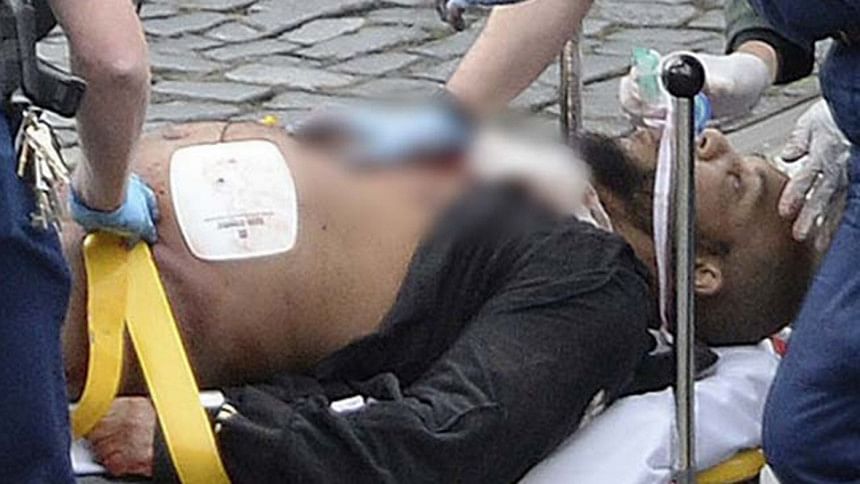London attacker was a criminal with militant links

- Attacker's associates wanted to join jihadi groups
- Khalid Masood had long string of convictions
- Police suspect "Islamist-related terrorism"
Before he killed at least four people in Britain's deadliest attack since the 2005 London bombings, Khalid Masood was considered by intelligence officers to be a criminal who posed little serious threat.
A British-born former teacher and Muslim convert, Masood had shown up on the periphery of previous terrorism investigations that brought him to the attention of Britain's MI5 spy agency.
But he was not under investigation when he sped across Westminster Bridge on Wednesday, ploughing down pedestrians with a hired car before running into the parliamentary grounds and fatally stabbing an unarmed policeman. He was shot dead by police.
Although some of those he was involved with included people suspected of being keen to travel to join jihadi groups overseas, Masood "himself never did so," said a U.S. government source, who spoke to Reuters on condition of anonymity.
"Masood was not the subject of any current investigations and there was no prior intelligence about his intent to mount a terrorist attack," London police said in a statement.
"However, he was known to police and has a range of previous convictions for assaults, including GBH (grievous bodily harm), possession of offensive weapons and public order offences."
Islamic State claimed responsibility for Masood's attack, although it was unclear what links - if any - he had with the militant group.
BRITISH-BORN KILLER
The 52-year-old was born in Kent to the southeast of London and moved though several addresses in England, although he was known to have lived recently in Birmingham in central England.
Known by a number of other aliases, he racked up a string of convictions, but none for terrorism-related offences. His occupation was unclear.
It was as long ago as November 1983 that he first came to the attention of authorities when he was found guilty of causing criminal damage, while his last conviction came 14 years ago in December 2003 for possession of a knife.
Little detail has officially been given about the man and what might have led him to carry out Wednesday's attack, the deadliest in Britain since the London suicide bombings of 2005 by four young British Islamists, which killed 52.
"Our working assumption is that he was inspired by international terrorism," said Britain's most senior counterterrorism police officer, Mark Rowley, adding: "Islamist-related terrorism is our assumption."
One of his former neighbours in Birmingham said: "When I saw the pictures on TV and in the papers of the man who carried out the attack, I recognised him as the man who used to live next door."
"He had a young child, who I'd think was about 5 or 6 years old. There was a woman living there with him, an Asian woman. He seemed to be quite nice, he would be taking care of his garden and the weeds," Iwona Romek, 45, told reporters at her home.
In December, she said, he suddenly moved out.
The Daily Mail newspaper said Masood had been born Adrian Elms and was brought up by his single mother in the seaside town of Rye on England's south coast, later converting to Islam and changing his name.
Other media reports said he was a married father of three and a former English teacher who was into bodybuilding.
BIRMINGHAM CONNECTION
Birmingham has been one of the hotbeds for British Islamists. According to a study by the Henry Jackson think tank earlier this month, 39 of 269 people convicted in Britain of terrorism offences from 1998 to 2015 came from the city.
Among those plots was one to kidnap and behead a British soldier. In December, two men were found guilty of planning to give 3,000 pounds ($3,750) to Brussels bombing suspect Mohamed Abrini - widely known as "the man in the hat".
There are over 213,000 Muslims in Birmingham, making up over a fifth of the population, according to the 2011 census, and there has been growing concern about divisions in the diverse city.
The car Masood used in Wednesday's attack had been hired from rental firm Enterprise's Spring Hill branch in Birmingham, suggesting he still had connections to the area.
Since the attack in London, police have raided a number of addresses across the city, arresting five men and two women on suspicion of preparing terrorist acts.
Masood may have rented an apartment close to the Edgbaston area of Birmingham, not far from the Enterprise offices, and that was one of the properties raided by armed officers.
On the eve of the attack that Prime Minister Theresa May cast as an attack on democracy, Masood spent his last night in a budget hotel in Brighton on the south coast where he ate a takeaway kebab, the Sun newspaper said.
"An act of terrorism tried to silence our democracy," May told parliament. "He took out his rage indiscriminately against innocent men, women and children."

 For all latest news, follow The Daily Star's Google News channel.
For all latest news, follow The Daily Star's Google News channel. 








Comments